Unit 1 Lesson 1 A trip to China 课件 (共24张PPT) 冀教版(2024)七年级下册
文档属性
| 名称 | Unit 1 Lesson 1 A trip to China 课件 (共24张PPT) 冀教版(2024)七年级下册 |
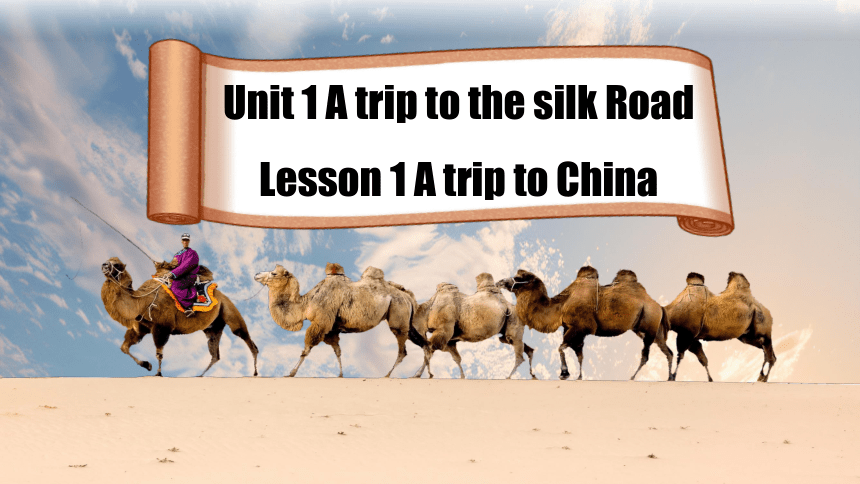
|
|
| 格式 | pptx | ||
| 文件大小 | 475.2MB | ||
| 资源类型 | 教案 | ||
| 版本资源 | 冀教版 | ||
| 科目 | 英语 | ||
| 更新时间 | 2025-02-06 00:00:00 | ||
图片预览

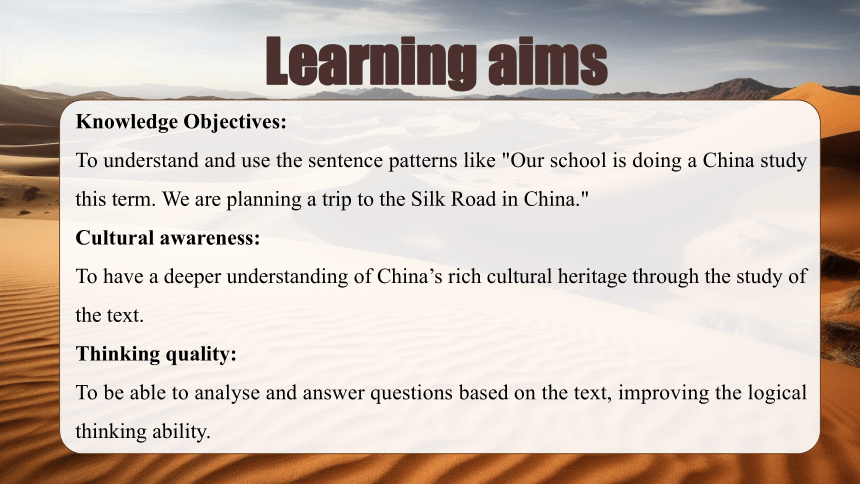
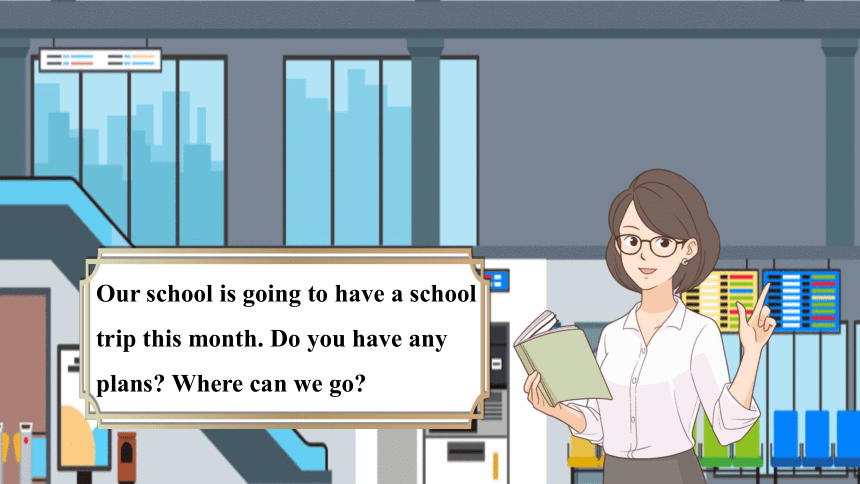
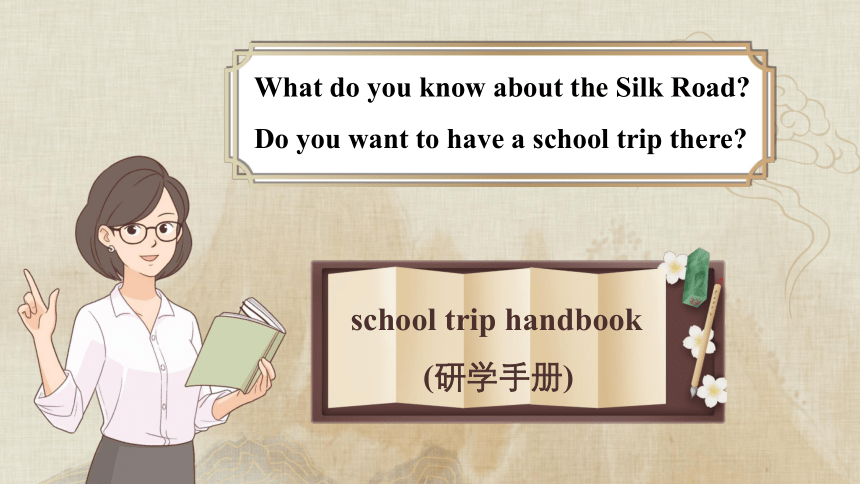
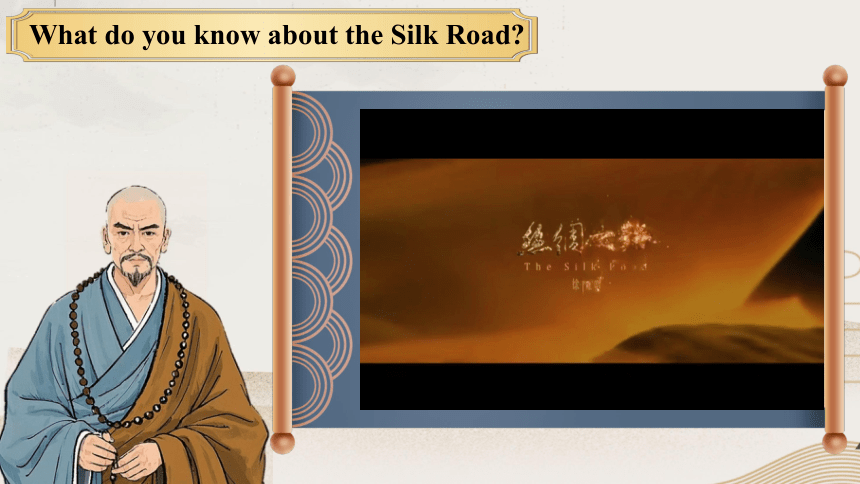
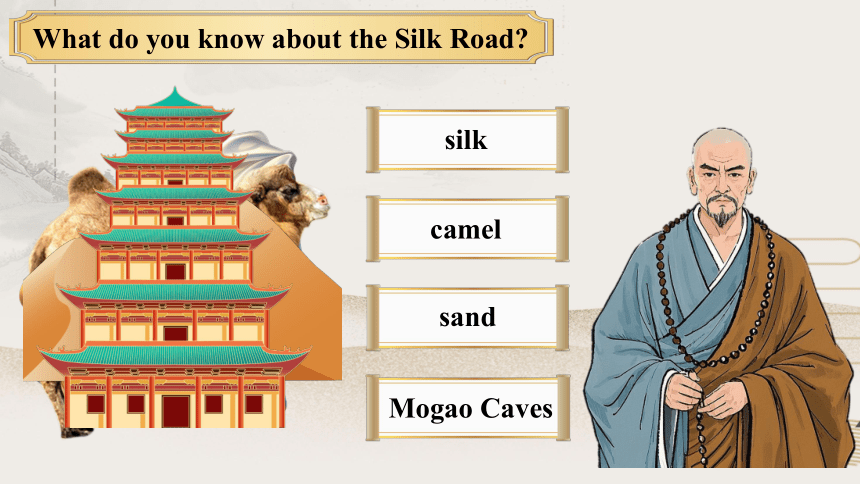
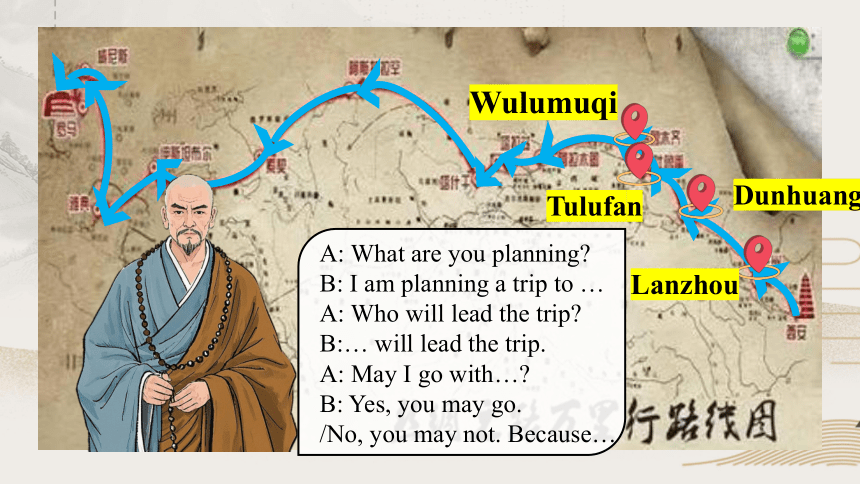
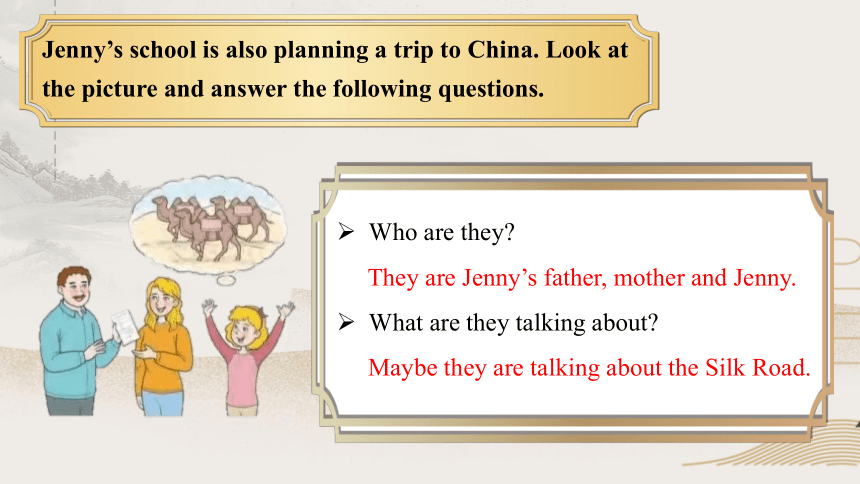
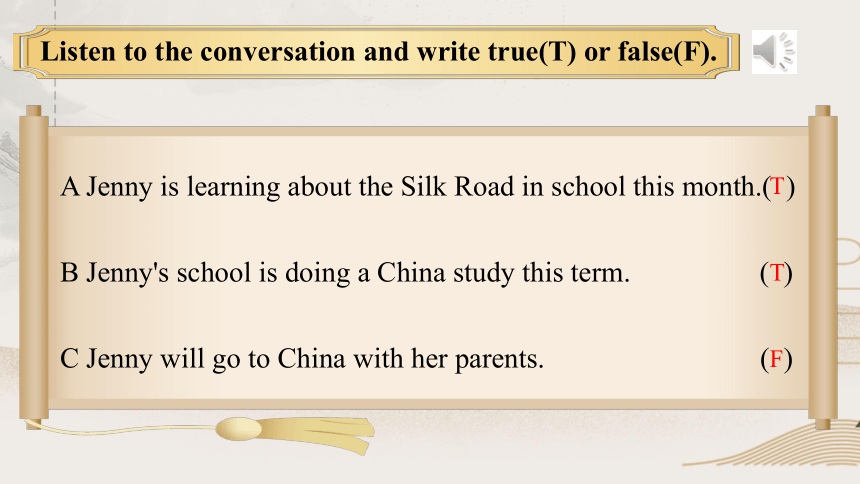
文档简介
Unit 1 A trip to the silk Road
Lesson 1 A trip to China
Knowledge Objectives:
To understand and use the sentence patterns like "Our school is doing a China study this term. We are planning a trip to the Silk Road in China."
Cultural awareness:
To have a deeper understanding of China’s rich cultural heritage through the study of the text.
Thinking quality:
To be able to analyse and answer questions based on the text, improving the logical thinking ability.
Learning aims
Our school is going to have a school trip this month. Do you have any plans? Where can we go?
What do you know about the Silk Road?
Do you want to have a school trip there?
school trip handbook
(研学手册)
What do you know about the Silk Road?
silk
camel
sand
Mogao Caves
What do you know about the Silk Road?
Wulumuqi
Tulufan
Dunhuang
Lanzhou
A: What are you planning?
B: I am planning a trip to …
A: Who will lead the trip?
B:… will lead the trip.
A: May I go with…?
B: Yes, you may go.
/No, you may not. Because…
Who are they?
They are Jenny’s father, mother and Jenny.
What are they talking about?
Maybe they are talking about the Silk Road.
Jenny’s school is also planning a trip to China. Look at the picture and answer the following questions.
A Jenny is learning about the Silk Road in school this month.( )
B Jenny's school is doing a China study this term. ( )
C Jenny will go to China with her parents. ( )
T
T
F
Listen to the conversation and write true(T) or false(F).
Jenny: Hi, Mum! Hi, Dad! Guess what! We're learning about the Silk Road in school this month.
Mr Smith: The Silk Road? That’s interesting!
Jenny: Yes, it is! Mum and Dad, may I ask you a question?
Mrs Smith: Sure, Jenny! What is it?
Jenny: My school is doing a China study this term. Some students from my class want to travel along the Silk Road in China. May I go with them?
Mr Smith: Who will lead the trip?
Jenny: Ms Martin! Here is the note from my school.
Jenny’s mother and father read the note.
Mrs Smith: Yes, you may go, Jenny. This is a good chance for you to learn important things about China.
Jenny: Great! Thank you, Mum and Dad! I’m so excited! I will tell Li Ming the good news.
A Where do Jenny’s classmates want to travel?
B Who will lead the trip?
C What does Mrs Smith think about the trip?
The Silk Road in China.
Ms Martin.
This is a good chance for Jenny to learn important things about China.
Listen to the conversation again and answer the questions.
Dear parents,
Our school is doing a China study this term. We are planning a trip to the Silk Road in China. Ms Martin will lead the trip and travel with the students. All students in Grade 7 can join. For more information, please come to the meeting at 3:30 p.m. on Wednesday, March 2.
Regards,
Mr Franklin
A: Who will lead the trip?
B:…
A: who can join?
B:…
A: What is Jenny’ school doing this term?
B:…
A: What are they planning?
B:…
Read the note from Jenny’s school. Then make up a conversation with your partner.
Pair work
Let’s speak for our trip plan!
1. Work in pairs, choose a place.
2. Make a plan for your trip.
3. Discuss the plan with your deskmate.
1. Have a clear theme.
主题突出
2. Try to be accurate, fluent and creative.
正确、流畅、创意。
3. Focus on “trip”, “plan”.
关注“旅行”、“计划”
Assessments
和你的同桌讨论你的计划。
小组合作,选择一个旅行地。
为你的旅行制作计划。
Proposed by China in 2013, the Belt and Road Initiative aims to promote the Silk Road spirit in the new era. It is welcomed by many countries both as a public good and as a cooperation platform.
Learning tips
We’re learning about the Silk Road in school this month.
learn about 学习;了解
小孩子可以在学习音乐的同时玩得开心。
Kids can have fun and ___________music at the same time.
learn about
与learn 相关的其他短语:
learn...from...向……学习…,从……获得……
learn...by heart 熟记/记住……
learn to do sth.学习做某事
Mum and Dad, may I ask you a question?
May I...?我可以……吗?
"May I...?"是用于请求对方同意的交际用语,其同义表达为"Can/Could I...?"。常见回答如下:
(1)肯定回答:
Yes, you can.好的,你可以。
Yes, please.好的,请。
Sure./Of course./Certainly.当然可以。
(2)否定回答:
No, you can’t.不,你不能。
I’m sorry. You can’t.抱歉。不行。
I’m sorry, but…抱歉,但是……
I’m afraid not.恐怕不行。
You’d better not.你最好别。
—I can’t find my dictionary.__________I use yours?
—Sure, here you are.
A. Need B. May C. Must D.Should
B
Some students from my class want to travel along the Silk Road.
travel along 沿着……旅行
我们喜欢在周末沿着河边骑自行车。
We like to _______________ the river by bike on weekends.
travel along
Who will lead the trip?
lead 在此作及物动词。lead sb.into/to...意为"带领某人进入/去……"。leader作名词,意为"领导者;领袖"。
我将带领这支队伍。
I will________________.
lead the team
lead / li?d / v.带领;指路
Here is the note from my school.
(1)当句首为 here/there 等副词,主语为名词,且谓语动词为 be、go、come 等时,句子的主谓要倒装,结构为"Here/There+谓语+主语."。
Look! Here comes the train.瞧!火车开过来了
note
leave a note for sb.给某人留便条
write sb. a note/write a note to sb.给某人写便条
make/take notes记笔记
我们的老师让我们在课堂上认真做笔记。
Our teachers ask us to _________________carefully in class.
take/make notes
(2)note / n??t / n.正式文件;便条;笔记
This is a good chance for you to learn important things about China.
get/have a chance to do sth.有做某事的机会
give sb. a chance to do sth.给某人做某事的机会
我们每个人都有机会尝试新事物。
Every one of us ____________to try new things.
has a chance
(2)chance还可作不可数名词,意为"运气;偶然"。by chance 意为"偶然,碰巧"。
I found the interesting place____________.
我偶然间发现了这个有趣的地方。
by chance
(1)chance / t?ɑ?ns /n.机会;运气
I will tell Li Ming the good news.
与tell相关的常用结构有:
tell
tell sb. sth./tell sth. to sb.告诉某人某事
tell sb. about...告诉某人关于……的情况
tell sb. (not) to do sth.叮嘱某人(不要)做某事
让我来告诉你关于这部电影的情况。
Let me ______you _________the film.
tell about
Mr Brown told his son not________aloud(大声地)in the museum.
A. speak B. to speak C. speaking D. spoke
B
(1)tell / tel /v.告诉;命令,吩咐
What does Mrs Smith think about the trip?
think about 认为;考虑到
后可跟名词、代词或动词-ing 作宾语。"What do/does sb. think about...?"意为"某人认为……怎么样?",相当于"What do/does sb. think of...?"或"How do/does sb. like…?”
_______________________the movie?=_______________the movie?
How do you like
What do you think about/of
你认为这部电影怎么样?
news 为不可数名词。a piece of news 表示"一条新闻/消息";"基数词(大于1) +pieces of news"表示"……条新闻/消息"。
No news is good news.没消息就是好消息。
这是个好消息.
It’s ____________good news.
a piece of
(2)news / nju?z / n.新闻,消息
ou /a?/ about around _______________ ea /i:/ lead read____________
nk /?k/think thank____________________
tion /?n/ conversation information____________________
Listen and repeat. Write more words in each group.
一、单项选择题
Jenny ______ English at school now.
A. study B. is studying C. studies D. are studying
2.They ______ a trip to the Silk Road next month.
A. plan B. are planning C. will plan D. is planning
3.May I ______ your dictionary?
A. use B. using C. uses D. used
4.The teacher ______ the students to the museum tomorrow.
A. will lead B. lead C. leads D. led
B
B
A
A
二、英汉互译
我们学校这学期正在进行一个科学研究。
2.他们下个月将去旅行。
3.May I have a cup of tea?
4.The teacher is leading the students to sing a song.
Our school is doing a science study this term.
They will go on a trip next month.
我可以喝一杯茶吗?
老师正在带领学生们唱一首歌。
基础性作业
寻找课文中关于旅行计划相关的表达并将其整理在笔记本上。
拓展性作业
假设你是 Jenny 的同学,你也收到了学校关于丝绸之路旅行的通知。请你给你的笔友写一封信,介绍这次旅行计划,包括谁带领、什么时候有家长会获取更多信息等内容,字数不少于 50 字。
实践性作业
通过查阅资料,了解丝绸之路的历史意义和重要地点,并用英文制作一张手抄报,手抄报上至少包含 5 个关于丝绸之路的知识点和简单的英文解释。
Homework
Lesson 1 A trip to China
Knowledge Objectives:
To understand and use the sentence patterns like "Our school is doing a China study this term. We are planning a trip to the Silk Road in China."
Cultural awareness:
To have a deeper understanding of China’s rich cultural heritage through the study of the text.
Thinking quality:
To be able to analyse and answer questions based on the text, improving the logical thinking ability.
Learning aims
Our school is going to have a school trip this month. Do you have any plans? Where can we go?
What do you know about the Silk Road?
Do you want to have a school trip there?
school trip handbook
(研学手册)
What do you know about the Silk Road?
silk
camel
sand
Mogao Caves
What do you know about the Silk Road?
Wulumuqi
Tulufan
Dunhuang
Lanzhou
A: What are you planning?
B: I am planning a trip to …
A: Who will lead the trip?
B:… will lead the trip.
A: May I go with…?
B: Yes, you may go.
/No, you may not. Because…
Who are they?
They are Jenny’s father, mother and Jenny.
What are they talking about?
Maybe they are talking about the Silk Road.
Jenny’s school is also planning a trip to China. Look at the picture and answer the following questions.
A Jenny is learning about the Silk Road in school this month.( )
B Jenny's school is doing a China study this term. ( )
C Jenny will go to China with her parents. ( )
T
T
F
Listen to the conversation and write true(T) or false(F).
Jenny: Hi, Mum! Hi, Dad! Guess what! We're learning about the Silk Road in school this month.
Mr Smith: The Silk Road? That’s interesting!
Jenny: Yes, it is! Mum and Dad, may I ask you a question?
Mrs Smith: Sure, Jenny! What is it?
Jenny: My school is doing a China study this term. Some students from my class want to travel along the Silk Road in China. May I go with them?
Mr Smith: Who will lead the trip?
Jenny: Ms Martin! Here is the note from my school.
Jenny’s mother and father read the note.
Mrs Smith: Yes, you may go, Jenny. This is a good chance for you to learn important things about China.
Jenny: Great! Thank you, Mum and Dad! I’m so excited! I will tell Li Ming the good news.
A Where do Jenny’s classmates want to travel?
B Who will lead the trip?
C What does Mrs Smith think about the trip?
The Silk Road in China.
Ms Martin.
This is a good chance for Jenny to learn important things about China.
Listen to the conversation again and answer the questions.
Dear parents,
Our school is doing a China study this term. We are planning a trip to the Silk Road in China. Ms Martin will lead the trip and travel with the students. All students in Grade 7 can join. For more information, please come to the meeting at 3:30 p.m. on Wednesday, March 2.
Regards,
Mr Franklin
A: Who will lead the trip?
B:…
A: who can join?
B:…
A: What is Jenny’ school doing this term?
B:…
A: What are they planning?
B:…
Read the note from Jenny’s school. Then make up a conversation with your partner.
Pair work
Let’s speak for our trip plan!
1. Work in pairs, choose a place.
2. Make a plan for your trip.
3. Discuss the plan with your deskmate.
1. Have a clear theme.
主题突出
2. Try to be accurate, fluent and creative.
正确、流畅、创意。
3. Focus on “trip”, “plan”.
关注“旅行”、“计划”
Assessments
和你的同桌讨论你的计划。
小组合作,选择一个旅行地。
为你的旅行制作计划。
Proposed by China in 2013, the Belt and Road Initiative aims to promote the Silk Road spirit in the new era. It is welcomed by many countries both as a public good and as a cooperation platform.
Learning tips
We’re learning about the Silk Road in school this month.
learn about 学习;了解
小孩子可以在学习音乐的同时玩得开心。
Kids can have fun and ___________music at the same time.
learn about
与learn 相关的其他短语:
learn...from...向……学习…,从……获得……
learn...by heart 熟记/记住……
learn to do sth.学习做某事
Mum and Dad, may I ask you a question?
May I...?我可以……吗?
"May I...?"是用于请求对方同意的交际用语,其同义表达为"Can/Could I...?"。常见回答如下:
(1)肯定回答:
Yes, you can.好的,你可以。
Yes, please.好的,请。
Sure./Of course./Certainly.当然可以。
(2)否定回答:
No, you can’t.不,你不能。
I’m sorry. You can’t.抱歉。不行。
I’m sorry, but…抱歉,但是……
I’m afraid not.恐怕不行。
You’d better not.你最好别。
—I can’t find my dictionary.__________I use yours?
—Sure, here you are.
A. Need B. May C. Must D.Should
B
Some students from my class want to travel along the Silk Road.
travel along 沿着……旅行
我们喜欢在周末沿着河边骑自行车。
We like to _______________ the river by bike on weekends.
travel along
Who will lead the trip?
lead 在此作及物动词。lead sb.into/to...意为"带领某人进入/去……"。leader作名词,意为"领导者;领袖"。
我将带领这支队伍。
I will________________.
lead the team
lead / li?d / v.带领;指路
Here is the note from my school.
(1)当句首为 here/there 等副词,主语为名词,且谓语动词为 be、go、come 等时,句子的主谓要倒装,结构为"Here/There+谓语+主语."。
Look! Here comes the train.瞧!火车开过来了
note
leave a note for sb.给某人留便条
write sb. a note/write a note to sb.给某人写便条
make/take notes记笔记
我们的老师让我们在课堂上认真做笔记。
Our teachers ask us to _________________carefully in class.
take/make notes
(2)note / n??t / n.正式文件;便条;笔记
This is a good chance for you to learn important things about China.
get/have a chance to do sth.有做某事的机会
give sb. a chance to do sth.给某人做某事的机会
我们每个人都有机会尝试新事物。
Every one of us ____________to try new things.
has a chance
(2)chance还可作不可数名词,意为"运气;偶然"。by chance 意为"偶然,碰巧"。
I found the interesting place____________.
我偶然间发现了这个有趣的地方。
by chance
(1)chance / t?ɑ?ns /n.机会;运气
I will tell Li Ming the good news.
与tell相关的常用结构有:
tell
tell sb. sth./tell sth. to sb.告诉某人某事
tell sb. about...告诉某人关于……的情况
tell sb. (not) to do sth.叮嘱某人(不要)做某事
让我来告诉你关于这部电影的情况。
Let me ______you _________the film.
tell about
Mr Brown told his son not________aloud(大声地)in the museum.
A. speak B. to speak C. speaking D. spoke
B
(1)tell / tel /v.告诉;命令,吩咐
What does Mrs Smith think about the trip?
think about 认为;考虑到
后可跟名词、代词或动词-ing 作宾语。"What do/does sb. think about...?"意为"某人认为……怎么样?",相当于"What do/does sb. think of...?"或"How do/does sb. like…?”
_______________________the movie?=_______________the movie?
How do you like
What do you think about/of
你认为这部电影怎么样?
news 为不可数名词。a piece of news 表示"一条新闻/消息";"基数词(大于1) +pieces of news"表示"……条新闻/消息"。
No news is good news.没消息就是好消息。
这是个好消息.
It’s ____________good news.
a piece of
(2)news / nju?z / n.新闻,消息
ou /a?/ about around _______________ ea /i:/ lead read____________
nk /?k/think thank____________________
tion /?n/ conversation information____________________
Listen and repeat. Write more words in each group.
一、单项选择题
Jenny ______ English at school now.
A. study B. is studying C. studies D. are studying
2.They ______ a trip to the Silk Road next month.
A. plan B. are planning C. will plan D. is planning
3.May I ______ your dictionary?
A. use B. using C. uses D. used
4.The teacher ______ the students to the museum tomorrow.
A. will lead B. lead C. leads D. led
B
B
A
A
二、英汉互译
我们学校这学期正在进行一个科学研究。
2.他们下个月将去旅行。
3.May I have a cup of tea?
4.The teacher is leading the students to sing a song.
Our school is doing a science study this term.
They will go on a trip next month.
我可以喝一杯茶吗?
老师正在带领学生们唱一首歌。
基础性作业
寻找课文中关于旅行计划相关的表达并将其整理在笔记本上。
拓展性作业
假设你是 Jenny 的同学,你也收到了学校关于丝绸之路旅行的通知。请你给你的笔友写一封信,介绍这次旅行计划,包括谁带领、什么时候有家长会获取更多信息等内容,字数不少于 50 字。
实践性作业
通过查阅资料,了解丝绸之路的历史意义和重要地点,并用英文制作一张手抄报,手抄报上至少包含 5 个关于丝绸之路的知识点和简单的英文解释。
Homework
同课章节目录
